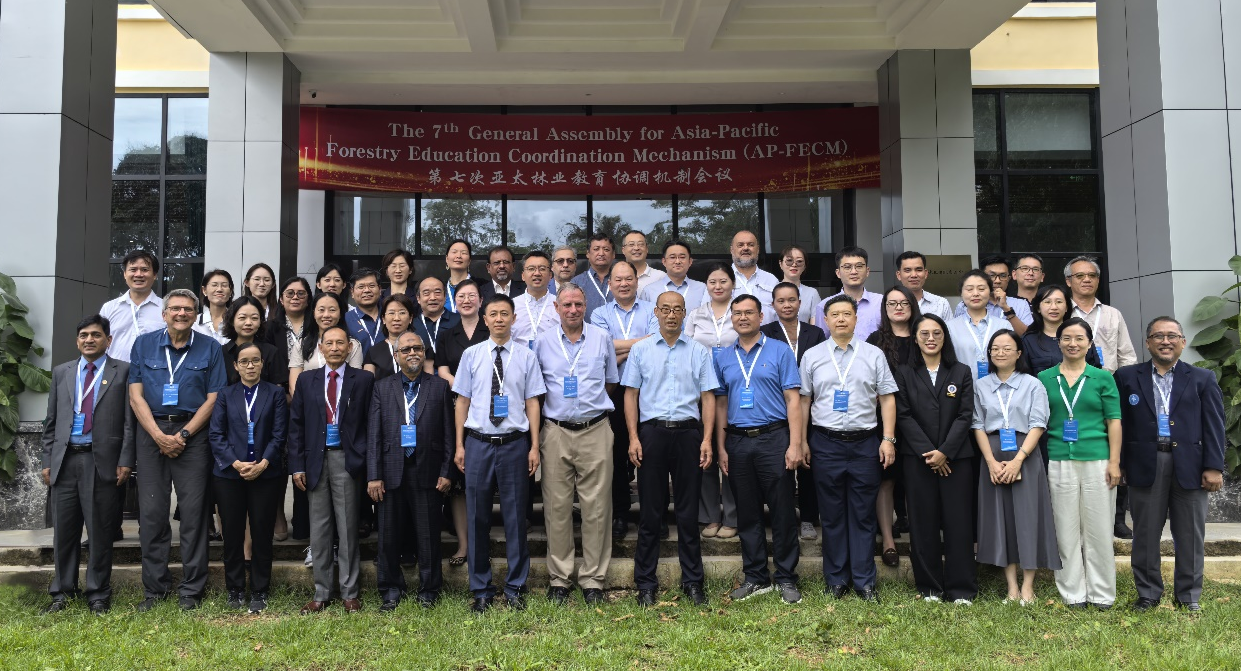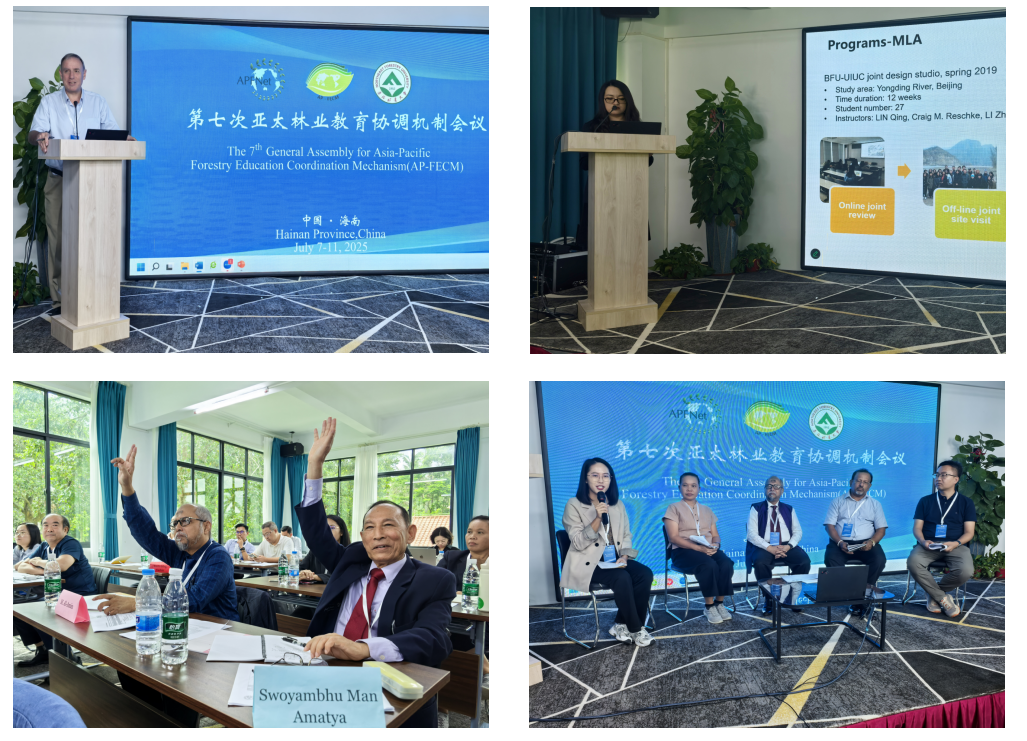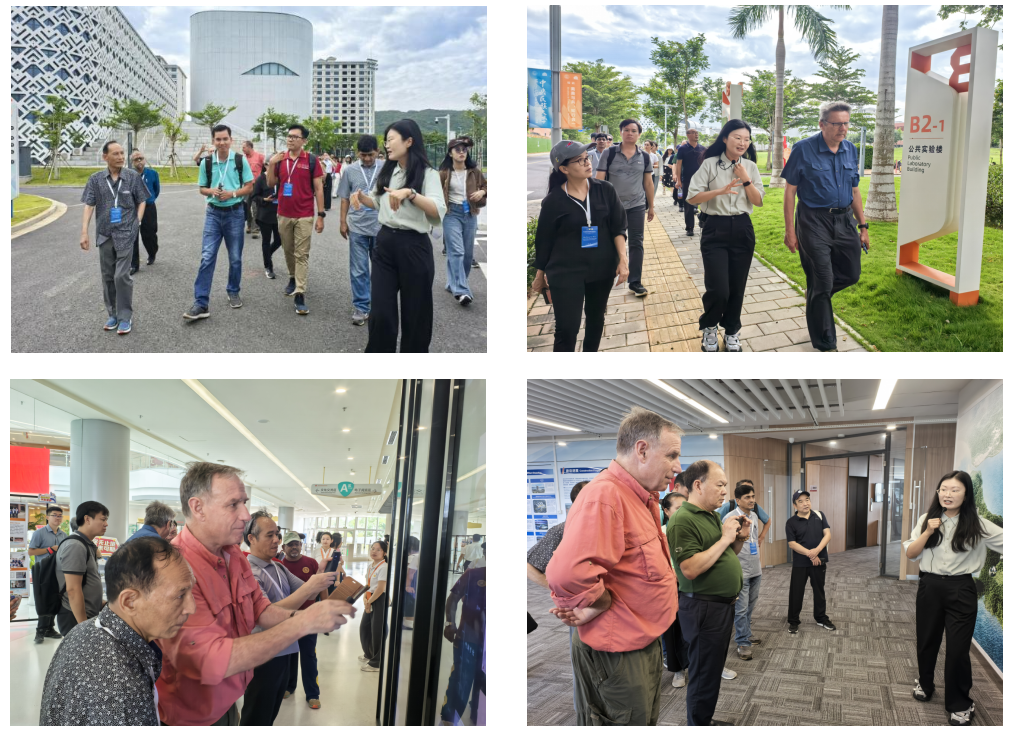The 7ᵗʰ General Assembly for the Asia-Pacific Forestry Education Coordination Mechanism (AP-FECM) was held at the International Exchange Centre for Tropical Forest, in Jianfeng, Hainan Province, between 7 and 11 July 2025. It was co-hosted by the Asia-Pacific Network for Sustainable Forest Management and Rehabilitation (APFNet), the University of British Columbia (UBC), the AP-FECM Executive Office, and Northeast Forestry University (NEFU) in China. The meeting comprised three sessions, each integrating keynote speeches and panel discussions. Over 50 university leaders, professors, and scholars from 16 economies took part in. The three core themes included:
● Technological advancements in forestry sectors and forestry higher education;
● Micro-certificate forestry programs to enhance industry-academia collaboration;
● Modern forestry education with interdisciplinary curricula.

Group photo
The Opening remarks were delivered respectively by Dr. Lu De, Executive Director of APFNet, Prof. John Innes, Chair of UBC AP-FECM, Mr. Ding Renzhan, Vice President of Southwest Forestry University and Mr. Liu Zhiming, Dean of Hainan International College of Northeast Forestry University.
Firstly, Dr. Lu De extended a warm welcome to all participants and expressed gratitude to UBC for serving as the Chair of AP-FECM. He stated that AP-FECM, as a platform for information exchange and mutual learning among members, played a vital role in promoting sustainable forest management and transforming forestry education. He credited the achievements of the mechanism to the collective efforts and mutual trust of all parties involved, and expressed confidence that the mechanism would contribute even greater wisdom and strength to regional forestry development. Prof. John Innes began his remarks by examining the state of forestry and forestry education in the Asia-Pacific region, highlighting their global contribution and significance. He then presented the current scale and emerging trends in global higher forestry education, contrasting past and present opportunities and challenges. His presentation prompted discussions among participants on the future direction and planning for forestry education in the region.

Each section with "keynote lectures + panel discussions", representatives actively contributing their views.
This meeting adopted a hybrid model of "indoor meetings + field trips", focusing on innovative practices and integration of production and education, optimization of interdisciplinary education systems, and promotion of collaborative innovation between forestry departments and educational institutions. Concurrently, a meeting of the AP-FECM Steering Committee was held, chaired by Prof. John Innes, who first presented an overview of the work of the AP-FECM Executive Office last year. Members jointly deliberated and refined the rules, followed by a discussion of all proposed topics, including:
● Future planning of the Sustainable Forest Management online courses;
● Evolution of online learning;
● The potential for developing the AP-FECM micro-certificate programs, update and repurpose the existing 15 online courses, combined with the current APFNet training programs and projects;
● Current application of new techniques in forestry and forestry education;
● Challenges of forestry education from regional perspectives;
● Enhancing sharing mechanisms among AP-FECM members and bridging the needs and offers;
● New initiatives and programs of AP-FECM from members.
On the afternoon of 9 July, participants went to visit Hainan Tropical Rainforest National Park (Jianfengling Nature Reserve). APFNet consultants from the Research Institute of Tropical Forestry, Chinese Academy of Forestry, showed them the reserve's unique biodiversity and rare tree species. As they traversed the canopy walkways, participants methodically recorded observations of varied understory vegetation.
On 10 July, a field trip was organized and held in Hainan Lingshui Li’an International Education Innovation Pilot Zone. A volunteer guide briefly showed participants around the buildings within the pilot zone, including its public teaching buildings, library, and domed stadium. As host of this AP-FECM meeting, Mr Liu Zhiming highlighted NEFU’s commitment to integrating ecological development with forestry education. He expressed that this meeting would serve as an opportunity to deepen cooperation, find consensus on new educational concepts, find opportunities for scientific collaboration, and open a new chapter in the development of high-quality forestry education and ecological development.

Participants visited Hainan Lingshui Li’an International Education Innovation Pilot Zone.
Over the past 14 years, AP-FECM has carried out a series of activities to support the reform and development of forestry education in the Asia-Pacific region, earning international awards. To date, six sessions of the meeting have been successfully held, which aimed to support the transformation and development of the mechanism, and strengthen cooperation among forestry universities and organizations in the Asia-Pacific region in forestry education and scientific research. It has significantly promoted collaborative innovation and transformative practices in forestry education across the region, enhancing exchanges and cooperation among forestry institutions, research organizations, and relevant stakeholders in the Asia-Pacific. In the future, forestry education will transition from traditional models to a “production-education integration” + “competency-oriented” model, with micro-certificate forestry programs being developed to shorten the distance with global forestry enthusiasts through online sharing.
![]() Asia-Pacific Network for Sustainable Forest Management and Rehabilitation.pdf
Asia-Pacific Network for Sustainable Forest Management and Rehabilitation.pdf